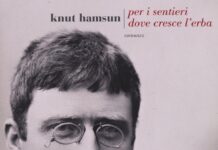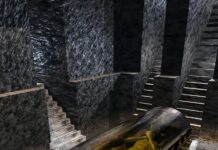– perché ho visto il mio cordone ombelicale crescere e diventare un albero
– perché l’albero è diventato una strada e le strade devono essere costantemente nutrite
– perché ho visto un pipistrello trasformarsi in una vecchia e la folla ha abbaiato per il suo sangue
– perché il bimbo del cespuglio piangeva al nostro cancello e la padrona di casa non si svegliava dal sonno
– perché ho visto un ragazzo stendere la sua uniforme scolastica su uno stendibiancheria invisibile
– perché ha raccolto l’orecchio dopo che gli era stato tagliato
– perché le dita dei piedi hanno ballato dopo che l’ascia ha perso la propria testa.
– perché la ragazza aveva il dono della pirocinesi
– perché l’incendio ha inghiottito tutta la sua famiglia
– perché il loro patrimonio è diventato carbonio
– perché il carbonio non potrà mai essere innocente
– perché nessuna storia è innocente
– perché i bambini si trasformavano in tuberi di igname dopo aver raccolto monete per terra
– perché gli ignami sanguinano quando vengono tagliati con un coltello da cucina in preparazione per la cena
– perché uno tornava con una cicatrice nel punto in cui il coltello aveva fatto un’incisione.
– perché l’albero non dava frutti eppure ospitava strani uccelli
– perché gli uccelli si nutrivano di nulla e riempivano i nostri tetti di escrementi
– perché questo porta sfortuna e le maledizioni non possono essere lavate via con semplice acqua
– perché ho invocato piogge di sangue e le chiuse sono state aperte
– perché la tempesta ha spazzato via il nostro villaggio dalle mappe
– perché le acque hanno sommerso la nostra storia
– perché una bambina senza storia è un tabù e deve essere lasciata al bivio
– perché questa bambina deve combattere fantasmi a più teste da sola
– perché gli spiriti si sono rifiutati di morire nel fuoco
– perché lei deve correre, deve ritornare al fiume
– perché nessuna testa d’ascia galleggiava sull’acqua
– perché lei deve sradicare l’albero con le unghie.
– perché non c’è nessuna vittoria di Pirro in questa storia
– perché c’è solo la resa
– perché non posso
– perché non lo farò.
Traduzione di Emilia Mirazchiyska
La poesia in originale è stata pubblicata da Strange Horizons Magazine:
http://strangehorizons.com/poetry/why/
Spiegandola l’autore dice “It speaks a bit to the horrors of the past fight and the terrors of the present, as one charts a course for what should lead into the future” [Parla un po’ degli orrori della lotta del passato e dei terrori del presente, mentre si traccia una rotta per ciò che dovrebbe portare al futuro].
Si ringraziano l’autore per la gentile concessione alla traduzione e alla pubblicazione su Inkroci ed Emilia Mirazchiyska per la traduzione in italiano.
Testo originale:
Why?
– because I watched my umbilical cord grow into a tree
– because the tree grew into a road & roads must constantly be fed
– because I witnessed a bat turn into an old woman & the mob bayed for her blood
– because the bush baby cried at our gate and the landlady did not wake from sleep
– because I saw a boy spread his school uniform on an invisible clothesline
– because he picked back his ear after it was chopped off
– because the toes danced after the axe lost its head.
– because the girl had the gift of pyrokinesis
– because the fire engulfed her entire family
– because their heritage became carbon
– because carbon can never be innocent
– because no story is innocent
– because the children turned into tubers of yam after picking coins on the ground
– because the yams bled when cut with a kitchen knife in preparation for supper
– because one returned with a scar where the knife had made an incision.
– because the tree did not yield fruits yet was home to strange birds
– because the birds were fed with nothingness & filled our roofs with droppings
– because this is bad luck & the curses cannot be washed off with mere water
– because I called down blood rains & the floodgates were opened
– because the storm swept our village off the map
– because the waters drowned our history
– because child with no history is taboo & must be left at crossroads
– because this child must fight multi-headed ghosts alone
– because the spirits have refused to die by fire
– because she must run, she must return to the river
– because no axe head was floating on the water
– because she must uproot the tree with fingernails.
– because there is no pyrrhic victory in this story
– because there is only surrender
– because I can’t
– because I won’t.

























